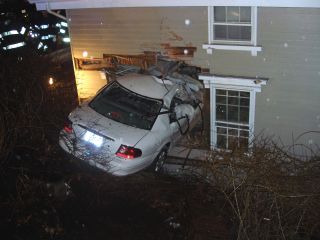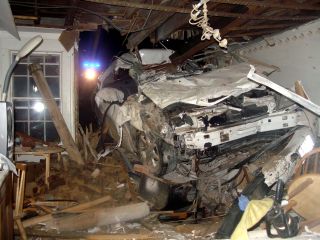April 30, 2007
Clarity

In his piece entitled "The Worst Op-ed I've Read in a Long Time, Ezra Klein describes the stance of its author, Doug Shoen :
It's almost a parody of the pernicious Democratic consultant. There's no core convictions, no policy preferences, no belief in Democratic ideas, no thoughts about how to lead public opinion, a fetish for bipartisanship, a willingness to ignore the ongoing sins of the Republicans and abandon popular progressive legislation, and an attempt to convince the Democratic Party that it's actual position is weaker than it is and compromise must start now. That he's not backed up by the facts of the poll nor the facts of Medicare Part D don't stop him in the least. This is very genuinely one of the worst opinion pieces I've ever encountered.
It's beginning to sink in over here at Dakota. The problem is not simply the criminal behavior of the neoconservative administration. "Democrats" have a problem too, and it's not the problem described by Republicans either. Rather than compromising, aquiescing and pleasing, liberals need to take a stand, develop a vision, and follow the truth. It is unwise to compromise with criminals. We must confess, all of us here at Dakota succumbed to Bill Clinton's charm. He is so smart and so nice and so committed to dialectical thinking . Trouble is that he's been busy finding ways to integrate neoconservative crap into his world and gets coopted rather badly. The democratic "perniciousness" is better seen in Hillary, who, in our book, lacks warmth and exudes political ambition.
Speaking of which, the author of the article on healthcare that Ezra Klein reviewed was traced back by commenter Tony V.- "Doug Schoen: The Schoen in 'Penn, Schoen & Berland', where Penn is Mark Penn, HRC's leading public opinion adviser." Hmmm
I just hope everyone is busy getting their ducks in a row. Remember if Bush and Cheney go, Nancy P. as Speaker of the House is next in line-- then she'd be the incumbent in 2008.
Photo note: In line, out of focus
April 29, 2007
Good News for the Grounded

In an article entitled "Spirit Tech" from the Slate Brain Issue, we were delighted to discover a machine that purports to induce mystical experiences. The Eight Coil Shakti can be had for a mere $220, inexpensive when you consider the alternatives like quitting your job, and taking your life in your hands to spend a year meditating eighteen hours a day at an ashram in Burma. Dr Michael Persinger, a neurotheologist at Laurentian University is the creator, so to speak.
As you know some of us here at Dakota are Woowoo Wannabees, who have been yearning for a mystical experience for some time now, to no avail. Others are more skeptical, which undoubtedly stops something of the sort from happening. In any case the Shakti solves alot of problems.
The list of cautions:
Use with care.
Use only the suggested session designs.
Do not use If You Have a History of Epilepsy, Migrane headaches or Psychiatric Disorders, or if you have a damaged or compromised Brain.
Do not use if you are taking psychiatric medications.
If you are ambidexterous, you'll need to accept some limitations. Click HERE to learn about them with illustrations.
Do not use if you do not understand English.
Do not use if you are less than 18 years of age.
Do not use it at the same time as other mind-machines or in combination with drugs.
Use at your own risk.
Only use with Magnetic Coils - do not use with electric current.
A bit sobering, but we shall take it under consideration.
Photo note: About as mystical as it gets around here -- shooting rear view mirror dingle dangles
April 27, 2007
Women Blogging from Baghdad

Want to know how things are going in Iraq?
"Riverbend" is a twenty five year old Iraqi woman with a blog called Baghdad Burning that she's been writing since August of 2003. It's quite famous, and was gathered into a prize winning book in 2005. She and her family are leaving Baghdad. A heartbreaking entry from her blog today:
I remember Baghdad before the war- one could live anywhere. We didn't know what our neighbors were- we didn't care. No one asked about religion or sect. No one bothered with what was considered a trivial topic: are you Sunni or Shia? You only asked something like that if you were uncouth and backward. Our lives revolve around it now. Our existence depends on hiding it or highlighting it- depending on the group of masked men who stop you or raid your home in the middle of the night.On a personal note, we've finally decided to leave. I guess I've known we would be leaving for a while now. We discussed it as a family dozens of times. At first, someone would suggest it tentatively because, it was just a preposterous idea- leaving ones home and extended family- leaving ones country- and to what? To where?
Since last summer, we had been discussing it more and more. It was only a matter of time before what began as a suggestion- a last case scenario- soon took on solidity and developed into a plan. For the last couple of months, it has only been a matter of logistics. Plane or car? Jordan or Syria? Will we all leave together as a family? Or will it be only my brother and I at first?
After Jordan or Syria- where then? Obviously, either of those countries is going to be a transit to something else. They are both overflowing with Iraqi refugees, and every single Iraqi living in either country is complaining of the fact that work is difficult to come by, and getting a residency is even more difficult. There is also the little problem of being turned back at the border. Thousands of Iraqis aren't being let into Syria or Jordan- and there are no definite criteria for entry, the decision is based on the whim of the border patrol guard checking your passport.
An airplane isn't necessarily safer, as the trip to Baghdad International Airport is in itself risky and travelers are just as likely to be refused permission to enter the country (Syria and Jordan) if they arrive by airplane. And if you're wondering why Syria or Jordan, because they are the only two countries that will let Iraqis in without a visa. Following up visa issues with the few functioning embassies or consulates in Baghdad is next to impossible.
So we've been busy. Busy trying to decide what part of our lives to leave behind. Which memories are dispensable? We, like many Iraqis, are not the classic refugees- the ones with only the clothes on their backs and no choice. We are choosing to leave because the other option is simply a continuation of what has been one long nightmare- stay and wait and try to survive.
On the one hand, I know that leaving the country and starting a new life somewhere else- as yet unknown- is such a huge thing that it should dwarf every trivial concern. The funny thing is that it’s the trivial that seems to occupy our lives. We discuss whether to take photo albums or leave them behind. Can I bring along a stuffed animal I've had since the age of four? Is there room for E.'s guitar? What clothes do we take? Summer clothes? The winter clothes too? What about my books? What about the CDs, the baby pictures?
The problem is that we don't even know if we'll ever see this stuff again. We don't know if whatever we leave, including the house, will be available when and if we come back. There are moments when the injustice of having to leave your country, simply because an imbecile got it into his head to invade it, is overwhelming. It is unfair that in order to survive and live normally, we have to leave our home and what remains of family and friends… And to what?
It's difficult to decide which is more frightening- car bombs and militias, or having to leave everything you know and love, to some unspecified place for a future where nothing is certain.
Jane Stillwater is a 64 year old liberal blogger from Berkeley. She decided to see what was going on in Iraq for herself, went to Baghdad to try to embed with the troops and managed to come back in one piece, or so it seems:
When I was in Iraq, I brushed my teeth with the non-potable water. Having survived brushing my teeth with the tap water in Afghanistan and Mexico (with the help of some Cipro), I was thinking, "Who's afraid of a little bacteria?" Well, since I've been back, my mouth just hasn't felt right. OMG! Maybe the water was non-potable because it was filled with depleted uranium? Then I started getting really paranoid. "I'm gonna die of mouth cancer!" Me and Sigmund Freud. Yuck!Then I got a phone call from a man who used to work as a trucker for KBR in Iraq and I realized that he had a LOT more to worry about than me. "I was only over there for four months but already my body has aged 30 years and my muscle mass is just melting away." KBR paid him $8,000 a month to drive the big rigs all over central Iraq. "And I'd give every cent of it back in a heartbeat if I could get my health back." Fat chance of that happening.....
The contractor has lost three inches off of his biceps. What happened over there? Depleted uranium? "I wouldn't be surprised. Iraq is the most polluted country in the world. It scares the hell out of me." Then he added, "I think part of my nerve damage comes from wearing 56 pounds worth of body armor for 12 or15 hours at a time because rather than up-armor the trucks, they up-armored the drivers."........
"Do you think you will ever go back to Iraq?" I asked him. "I can't go back. I'd never pass the physical." He then gave me the names and numbers of several friends who had suffered the same experience. Scary.
In other words Iraq is an even bigger mess than you can imagine.
One didn't have to to be a genius to see this coming. One need only look at history.
Michiko Kakutani reviews the book "Nixon and Kissinger" for the New York Times:
The current war in Iraq is mentioned only once in Robert Dallek’s engrossing new book, “Nixon and Kissinger,” and yet the reader cannot help regarding his account of the Nixon White House and its handling of the Vietnam War as a kind of parable about the presidency of George W. Bush and its determination to stay the course in Iraq.Indeed, Mr. Dallek seems to have taken up the much-written-about subject of Richard M. Nixon and his national security adviser (and later secretary of state) Henry A. Kissinger with just this sort of subtext in mind, for he ends his preface with this observation: “Arguments about the wisdom of the war in Iraq and how to end U.S. involvement there, relations with China and Russia, what to do about enduring Mideast tensions between Israelis and Arabs, and the advantages and disadvantages of an imperial presidency can, I believe, be usefully considered in the context of a fresh look at Nixon and Kissinger and the power they wielded for good and ill.”
What "good" was that again?
Photo note: One finds angels in such strange places. I had to shoot her from behind the wheel, so she's out of focus and I couldn't get her counterpart on the other side in the frame
April 26, 2007
Raising Vibrations This Morning

All of us here at Dakota think it's time for a bit of frivolity, given that the House is doing their job, and Dennis Kuchinich is doing ours.
Subject: Fw: The Chain Letter You've Been Waiting For (by Nora Ephron)
Dear Friends,This chain letter was started in hopes of bringing relief to tired and discouraged women.
Just send a copy of this letter to five of your
female friends who are equally tired and discontented. Then bundle up
the man in your life, send him to the woman whose name appears at
the top of the following list, and add your name to the bottom of the list.
When your turn comes, you will receive 15,625 men. One of them is
bound to be better than the one you already have, if you have one.At the writing of this letter, a friend of mine had already received
184 men, all of whom were better than the sad example she started
out with.An unmarried woman living with her widowed mother was able to choose
between a Chippendale dancer and an Olympic swimmer. You can be lucky,
too, but DO NOT BREAK THE CHAIN!One woman broke the chain and got her own husband
So let's keep it going, ladies! Just add your name and address to the
list below:Laura Bush
1600 Pennsylvania Avenue
Washington, DC
We know, we know, that was still too political for you, right?. Let's take it to the next best thought. How about a little excitment?
We give up. Here's more than enough precocious cuteness to satisfy. Shirley Temple before she turned Black and Bojangles before civil rights and affirmative action. She's so amazing. Want another? Shirley T. set high standards for girls of my generation.
Photo note: Sunny daffodils taken in 2003, with my old camera, which is why they're out of focus, before I stopped taking flower pictures
April 25, 2007
Contortionist, Spinning

An intimate group seated upon the optimist rug in the Offal Office.
Condi, addressing the Pres, but glancing at Karl: Even though you and I don't use email because the written word is not your greatest strength, and I prefer embossed stationary for my correspondence, it looks like some of us who have not been fastidious might begin to worry should they scour the RNC's hard drives.
W, mildly displeased: Whaddya mean? Fredo did a great job punting and he didn't even havta lie-- the Democratics bought it hook line and sinker.
Turd Blossom squirming: Just in case, how are we gonna flip it guys?
The Dick aka Big Time: Let's see, Arlen had a lot of success blustering, but Ashcroft's Plame investigation did the trick. I say we do our own investigation of ourselves and find ourselves innocent.
Rove to Gonzales: We should ease up on the Department of Justice for awhile. Who's in place, Fredo?
Gonzales: How about your evil twin, Scott Bloch, over at the Office of Special Counsel, Turdie? He did a great job on gays for us, Let's get him right on this.
W: I gotta go take care of the old lady She's havin' a hard day.
Photo note: Another contortionist spinning, taken on location Lijaing, China
Addendum" Translating Cheney - most amusing
April 23, 2007
See A Pattern?

Gee whiz, it seems that various long term malevolent plots are coming to light. Although most have been surreptitiously created, we are beginning to put the pieces together, so that we can see the outlines more clearly. I thought I would take the opportunity to list just a few, in case you haven't been paying attention, and because I had a good metaphorophoto.
Let's see, there's the plot to replace federal prosecutors who were prosecuting Republican crimes, and neglecting trumped up voter fraud cases, so that voter identification will be required at the polls, and poor people, who usually vote for Democrats and are most unlikely to have photo identification, will be disenfranchised.
There's the plot to institute something like the British Official Secrets Act right here in the USofA, which would serve to silence what's left of the press officially.
How about the small plot to cover up the circumstances of Pat Tillman's death?
Or the plot to infuse our beef with antibiotics for the convenience of agribusiness?
Of course there's the plot to systematically siphon money to Republican contributors by awarding no bid government contracts to contributors in Iraq and New Orleans
Or consider the plot to hold our troops hostage so that the President can continue to the needless slaughter, and keep those contracts coming.
How about the plot to establish a private army that serves without oversight, not to mention all the extraordinary renditons, detainment camps and abysmal places like Guantanamo that are not so secret?
And how's this for a doozy hot off the press?
Although there's rather long list of individual Bush appointees who have been caught behaving criminally, it seems that a larger and more ominous pattern is emerging. It behooves us to pay close attention.
Photo note: A metaphorophoto where it's hard to see what's really going on. Taken on location at rush hour in Hong Kong.
April 21, 2007
Earth Day

Happy Earth Day!
Two wonderful pieces of news. The hoi poli is going green, and better yet, investing in going green, and Al Gore might run for President.
As the crimes of the neoconservative corporatocracy are exposed, layer by stinking layer, perhaps we will be inspired to elect someone smart, with experience, whose intentions are to preserve the earth and keep the peace, rather than rape the earth and wage war.
When was it when we began to choose our leaders for their frat party personality rather than their vision?
As to the state of our being in the world, take a peek at this visual summary, scroll to the end, and send it to your friends for Earth Day.
Photo note: Although I was searching through my archives for a spectacular flower picture this morning, figuring I could throw one in on Earth Day. for heaven's sake, (I have been avoiding them for the sake of complexity)
I found this shot taken on location in beautiful downtown Poughkeepsie or was it Newburgh, New York last year while farm shopping.
April 20, 2007
Light into Darkness

From a commenter on Firedoglake:
Explaining his role in the botched firing of federal prosecutors, Gonzales uttered the phrase “I don’t recall” and its variants (”I have no recollection,” “I have no memory”) 64 times. Along the way, his answer became so routine that a Marine in the crowd put down his poster protesting the Iraq war and replaced it with a running “I don’t recall” tally.Take Gonzales’s tally along with that of his former chief of staff, who uttered the phrase “I don’t remember” 122 times before the same committee three weeks ago, and the Justice Department might want to consider handing out Ginkgo biloba in the employee cafeteria.
Christy Hardin Smith, a litigator herself, has an excellent commentary there, as does Dan Froomkin at washingtonpost.com
If you want to see the testimony with your very own eyes, the juicy parts are available because Paul Keil at TPM Muckraker has posted clips, rescuing them from obscurity on C-Spam 3. , or you may watch Jon Stewart's summary where he identifies Gonzales' use of "The Ken Lay Defense" - I'm not corrupt I'm incompetent and the "Chair Defense" - I was in the room as an inanimate object.
The networks were busy giving paranoid schizophrenics everywhere a reason to act out, or covering the President's bizarre performance in the Midwest where he did his Bushie best to distract our attention from the Senate hearings. W.'s tongue was loosened, and he settled into an enthusiastically received incoherent ramble which went on for an hour and a half. I found a possible explanation, again, in the comments at Firedoglake,
beginning with a line from said rambling:
_”The best thing about my family is my wife. She is a great first lady. I know that sounds not very objective, but that’s how I feel. And she’s also patient. Putting up with me requires a lot of patience.” One of the gossip columnists at E! online, Ted Casablancas, had a bit in his column yesterday claiming that Stepford Laura is living at the Adam-Hays Hotel in DC. She’s supposed to have moved out because Commander Codpiece is off the wagon big-time.
As Andy Card told Jon Stewart, "Even people who do not like the president want to be his friend.". Now we can all have that beer with him , it seems.
Photo note: A Western -- metaphorophotographically speaking - bringing light into darkness.
April 18, 2007
Risk

As long as we're on the subject of risks, I thought I would share something that happened on Monday night.
It's always a dilemma for me to write about the personal lives of others, but, since this incident was rather well covered in the local media due to its spectacular nature, and it is both a tragedy and a miracle, I decided to forge ahead. Of course I had my camera with me.
At about 12:30 AM on Monday night, I received an hysterical phone call from a dear and close personal friend. She was quite incoherent -- something about an explosion at her house. The police were there already, so I grabbed a blanket and a flashlight and rushed over.
When I arrived there were scores of fire engines and police cars outside. A white car was protruding from what was once her living room. I found my friend sitting on the couch in the the attached house next door, undone, but miraculously unscathed. She was terribly worried about the people in the car and about her cats (who were found the next morning, physically unharmed, but plastered against the wall under the bed in terror).
Tragically two high school seniors lost their lives. They had been speeding along the road which runs along the hill about ten feet above her house when they lost control of car on the wet pavement and took to the air, penetrating the wall of the house at eighty miles an hour. The police had been following them and so were right on the scene.
My friend was asleep on the second floor at the time of the impact. She awakened confused and walked down the stairs into the chaos and out the front door. She remembers calling to the people in the car, but there was no answer, and hearing the police do the same from outside. Thank goodness there was no fire.
As the evening wore on, she calmed down and began to look at the blessings that stemmed from this incredible accident. She will probably be placed on the top of the list for senior housing. Before this happened she had been planning to sell her house because it's on three levels joined by steep antique stairs, and is an increasing problem for her arthritic knees. The repairs needed before it could be put on the market were minor, numerous and daunting. Now insurance will cover everything, new furniture, new clothing, restoration of damaged possessions and the reconstruction of the building, which she says she'll never sleep in again. She plans to remodel and sell, though potential buyers might think twice.
Sadly there are no hidden blessings for the two boys who lost their lives and their families.
Last year a car hit the wall of the house next door, though there were no fatalities. When that happened, she felt at risk, and rightly so, as it turns out.

This is the view of her living room from the inside.
Photo note: see above
Shattered

Larry Johnson at TPM Cafe asks in response to the Virginia Tech murders, Now Do You Understand?
Okay. Big deep breath. This is horrible and this is tragic and this gives us an idea of what it is like to live just one day in Iraq.....
And then he lists seven news reports of Iraqi deaths on April 15, 2007.
Let's total the score: at least 65 Iraqis dead in four attacks vs. 31 Americans shot at Virginia Tech. Whoops, forgot the 20 kidnapped policemen. Can you imagine?The next time you hear Dick Cheney or George Bush blame the public attitude regarding Iraq on the media's failure to report "good news", examine carefully our reaction to the shooting at Virginia Tech. Look at our collective shock. Our horrified reaction. The public sorrow. Yet, in truth, this is an exceptional, unusual day in America. It is not our common experience. But we cannot say the same about Iraq.
And while we're all freaking out, it might be a good time to look at security guru Bruce Shneier's article,The Psychology of Security, so that we don't exchange too many liberties for safety in spite of this tragedy, as is our wont.
Security is a trade-off. This is something I have written about extensively, and is a notion critical to understanding the psychology of security. There's no such thing as absolute security, and any gain in security always involves some sort of trade-off............It's my contention that these irrational trade-offs can be explained by psychology. That something inherent in how our brains work makes us more likely to be afraid of flying than of driving, and more likely to want to spend money, time, and other resources mitigating the risks of terrorism than those of food poisoning. And moreover, that these seeming irrationalities have a good evolutionary reason for existing: they've served our species well in the past. Understanding what they are, why they exist, and why they're failing us now is critical to understanding how we make security decisions. It's critical to understanding why, as a successful species on the planet, we make so many bad security trade-offs.
He says
* People exaggerate spectacular but rare risks and downplay common risks.
* People have trouble estimating risks for anything not exactly like their normal situation.
* Personified risks are perceived to be greater than anonymous risks.
* People underestimate risks they willingly take and overestimate risks in situations they can't control.
* Last, people overestimate risks that are being talked about and remain an object of public scrutiny.
Schneir also provides a list from Ropeik and Gray's book " Risk: A Practical Guide for Deciding What's Really Safe and What's Really Dangerous in the World Around You":
* Most people are more afraid of risks that are new than those they've lived with for a while. In the summer of 1999, New Yorkers were extremely afraid of West Nile virus, a mosquito-borne infection that had never been seen in the United States. By the summer of 2001, though the virus continued to show up and make a few people sick, the fear had abated. The risk was still there, but New Yorkers had lived with it for a while. Their familiarity with it helped them see it differently.
* Most people are less afraid of risks that are natural than those that are human-made. Many people are more afraid of radiation from nuclear waste, or cell phones, than they are of radiation from the sun, a far greater risk.
* Most people are less afraid of a risk they choose to take than of a risk imposed on them. Smokers are less afraid of smoking than they are of asbestos and other indoor air pollution in their workplace, which is something over which they have little choice.
* Most people are less afraid of risks if the risk also confers some benefits they want. People risk injury or death in an earthquake by living in San Francisco or Los Angeles because they like those areas, or they can find work there.
* Most people are more afraid of risks that can kill them in particularly awful ways, like being eaten by a shark, than they are of the risk of dying in less awful ways, like heart disease--the leading killer in America.
* Most people are less afraid of a risk they feel they have some control over, like driving, and more afraid of a risk they don't control, like flying, or sitting in the passenger seat while somebody else drives.
* Most people are less afraid of risks that come from places, people, corporations, or governments they trust, and more afraid if the risk comes from a source they don't trust. Imagine being offered two glasses of clear liquid. You have to drink one. One comes from Oprah Winfrey. The other comes from a chemical company. Most people would choose Oprah's, even though they have no facts at all about what's in either glass.
* We are more afraid of risks that we are more aware of and less afraid of risks that we are less aware of. In the fall of 2001, awareness of terrorism was so high that fear was rampant, while fear of street crime and global climate change and other risks was low, not because those risks were gone, but because awareness was down.
* We are much more afraid of risks when uncertainty is high, and less afraid when we know more, which explains why we meet many new technologies with high initial concern.
* Adults are much more afraid of risks to their children than risks to themselves. Most people are more afraid of asbestos in their kids' school than asbestos in their own workplace.
* You will generally be more afraid of a risk that could directly affect you than a risk that threatens others. U.S. citizens were less afraid of terrorism before September 11, 2001, because up till then the Americans who had been the targets of terrorist attacks were almost always overseas. But suddenly on September 11, the risk became personal. When that happens, fear goes up, even though the statistical reality of the risk may still be very low.
Though statistics come down on either side, perhaps putting more controls on guns would cut down on homocides - it would certainly cut down on wars. Here's the The World Gun Crime Map, see for yourself. I think the real question is why is the "citizen's right to bear arms" the only "civil liberty" that seems to matter to this administration?
Photo note: I find this a mournful picture -- the intersection of the disparate -- all of it in shreds, barely hanging on under the blue sky
April 17, 2007
Sick Opportunist

What kind of guy
faced with 33 dead
gives a rallying cry
to the gun vote
instead?
Photo note: Empty containers against a brick wall about to tip over -- a hopeful metaphorophoto-- shot on location in Dali, China
April 14, 2007
How to Identify a Purveyor of Truthiness

Joseph T. Wells, CPA, founder and chairman of the Association of Certified Fraud Examiners, has a number of savvy techniques for identifying a liar, which he has published in an article entitled "A Fish Story -- Or Not?" We might find this information useful as we watch the Congressional inquires proceed.
.....lying is innate to the human species and comes about for two genetically programmed reasons: to receive rewards and/or to avoid punishment. Whether we lie depends on our calculation of the reward/punishment equation. This is called “situational honesty.” Because most of us are conditioned to believe lying is wrong, it creates stress. (That’s not true with very young children and pathological liars.)....An experienced interviewer begins by asking easy, nonthreatening questions (“Where did you go to college?”) while discreetly observing the person’s behavior. Then, when the questions get tough (“Is there any reason someone would say you have been cooking the books?”), the interviewer will look for telltale behavioral changes. This process is known as “calibration” and is a vital part of detecting deception.
Wells outlines specific suspicious behaviors like:
Overuse of respectQ: Delbert, I’m not accusing you of anything; I’m just trying to find the truth.
A: Sir, you obviously have a difficult job here. I greatly admire what you’re trying to do.
The real truth is that truthful people are rarely overly polite when they believe they’re being accused of something they didn’t do. More likely, they will be offended and let you know it.
Hopefully this morsel will tempt you to read the whole article, it's not that long.
Sady, in order to fall into these traps, the liar needs to be a person of some conscience. When a sociopath lies it's just part of the game, S/he feels satisfaction rather than guilt, and, therefore, doesn't display the telltale signs. I'm hoping that a few of those Christian staffers who graduated from Regent University School of Law are silly sheep rather than hardcore sociopaths, and will be flustered when questioned.
Speaking of truthiness, check out Wikiality a most clever and complex parody of Wikipedia, The creators, whoever they are, tell us "Wikiality.com is in no way affiliated with Comedy Central, The Colbert Report, or Stephen Colbert, but we'd like to be." This will take some exploration, but will serve to boost your immune system. For instance, check out American elephant, Bears in submarine or under Foodie - DNL's Salsa Explosion.
Photo note: You never quite know what you shot until you examine your kill on the computer screen. This is Hong Kong at the cusp of the Year of the Pig where a Pig Decorating Contest yielded this metaphorophoto. Notice the origin of the propulsion of the performer (in this rather famous painting which I cannot identify for the life of me). I even like the off kilter red bar on the left -- looks like our firend might have something to grab onto as he takes to the air. If it weren't for the dyed hair and the black mustache, he bears a distinct resemblance to Karl Rove.
April 13, 2007
Wearing Thin

I was just composing a list of all the acts that are no longer considered crimes by this administration, you know, kidnapping, torture, treason, murder, destruction of presidential records, (that's as far as I went) --it would have been a dry and bitter entry-- when the universe intervened and delivered Godel Metric's scenario instead, which I have taken the liberty of copying in full for your reading pleasure, if that's the word.:
The last 4 years haven't so much been about screwups as about seeing just how much they can fuck with us and continue to get away with it."OK, this'll be good. A plant in the White House press room asking fake questions."
"Make him a gay prostitute!"
[twitters]
"How about a Congressman sending obscene IMs to House pages from the floor during a vote?"
[raucous laughter]
"Head of a major church gets outed by his gay hooker meth dealer?"
"Funny, but the gay joke is getting old. At some point it's going to seem bigoted."
"How about we accuse the Democrats of gay-bashing when they go after the Congressman?"
"Brilliant!"
"Have Trent Lott congratulate Strom Thurmond on his presidential political platform."
"Let's put the guy running the Arabian Horse Judging Association in charge of FEMA."
"What if there's a natural disaster or something?"
"That's just situational irony!"
"Let's invade a country and then staff the entire reconstruction agency with Young Republicans."
"Maybe a Presidential advisor could get fired for shoplifting."
"Wait! How about this? We send all of our emails through a totally illegal outside server, and then if the Democrats ask for them, we tell them we 'accidentally' deleted everything!"
[more laughter]
"So, would an 18-day gap in the emails be too obvious of a Watergate reference?"
"Wait, wait, here's a good one: the Vice President accidentally shoots his best friend in the face, then the friend apologizes to him and his family."
"What? That doesn't even make any sense."
"It's absurdist humor!"
"Hey, let's put one of the Iran-Contra guys in charge of the Homeland Security Agency."
"OK, OK, everyone. Let's calm down now and get back to business, all right?"
"Apparently this new scandal is now being referred to as DogAte." an anonymous comment from "sweetmister" on Metafilter.
Glenn Greenwald documents what seems to be the DogAte Pattern, and Jack Cafferty broadcasts it.
Photo note: From the Feinstein American Flag Collection
April 12, 2007
Shutting Them Up

I'm sure Don Imus is shocked by the burgeoning response to what he would consider just a run-at-the-mouth remark. After all, talk shows like his abound, racist, sexist insults fly. and the vitriolic Ann Coulter (no cllickie for that harridan, we are actively ignoring her) has deliberately used many more incendiary phrases than "nappy headed ho's".
Marty Kaplan, currently the Associate Dean of the Annenberg School for Communication at USC, writes about Imus as the tool of the corporatocracy:
The most important thing to know about Don Imus is that he's a cash cow for Viacom and General Electric. Or was, until his advertisers began peeling away. The only reason that shock jocks are on the air in the first place is that people pay attention to them. They - we - lend our ears and eyeballs to Imus and his ilk because their outrageousness amuses us.A merely curmudgeonly cowboy would not pull big numbers, and neither the political class nor the punditocracy would return his bookers' calls. What makes the powerful kiss his ring, and what makes people tune in, is how badboy - how rude, disrespectful, licking-the-razor - Imus is. Clearly, large audiences like to gasp at what he gets away with, and CBS and NBC have been champs at spinning those OMG's into ka-ching.
The same could be said of the envelope-pushing by Rush Limbaugh, Ann Coulter, Glenn Beck, Sean Hannity, Michael Savage and the dozens of other circus acts in the infotainment freak show. Their effect may be to debase discourse, inflame prejudice, sow ignorance, exculpate criminality, incite rancor, ruin reputations, and stoke the right-wing base - but their effect is not their job. Their job is to make money for the corporations that employ them. We may revile them for being Rove's toadies, but we're chumps if we ignore how relentlessly the companies that employ them monetize their noxious shtick.
Imagine if the audience's appetite for outrage extended to the dying of American democracy. Imagine if media bosses believed that we're insatiable for information about the Republican attempt to rig the '08 election by politicizing the Justice Department and prosecuting phony voter fraud. Imagine if the same kind of blanket coverage that's currently conferred on loopy astronauts, bratty rehaboholics, and, yes, outrageously slandered basketball teams, were afforded instead to the slow-motion fascism now on the move in America. Would we watch it the same Pavlovian way we watch tits, twits and tornadoes? [emphasis mine]
If honor and shame can drive programming decisions as decisively as Nielsens and ad dollars, maybe there's a way to convince media executives that the venom of Coulter et al is just as toxic to their corporate reputation, and just as unacceptable to Americans, as Imus's ho-talk.
Hear hear. And for those of you who minimize Imus's behavior, and that of the other hatemongers of the air, we are here to remind you of the role hate radio played in the genocides of Rwanda and the former Yugoslavia.
Sanctioning open bigotry in the media supports the malignant neoconservative agenda in this country. As the Justice Department scandal unfolds, we begin to see that the illusion of eliminating "voter fraud" is a thinly disguised plot to place obstacles between the underprivileged and their vote, thus thinning the ranks of those who might vote in their best interests against the Republican elite in the next presidential election. The Federalist Society (Alito and Roberts are both members) openly and regressively works against affirmative action, reproductive choice, employment and environmental regulation, all of which benefit minorities in this country. Nothing to joke about.
So when we hear blatant bigotry, let's turn it off and let it shrivel into oblivion from lack of attention. That's what all of us here at Dakota are doing toAnnie C. As Ismail Serageldin , suggests in his essay "Accumulated Fuel and Dangerous Sparks":
I do not seek legislation, but social consciousness. For it is social consciousness that establishes the norms of acceptable behavior. Freedom of expression remains our most precious right, and how we practice it tends to be conditioned more by social consciousness than by legislation. In the US, where stereotypes were widespread, and epithets for the various ethnic groups that make up the American population were commonplace, it is no longer admissible to mock the Jews or to make racist remarks about the blacks, or to show native Americans as bloodthirsty savages. Movies and shows that featured “Steppin Fetchit” and “Amos and Andy” have given way to shows like “Roots” and to films that show blacks as well-rounded human beings. Gradually, every group is allowed to keep its dignity, and children are taught to exercise mutual respect when talking of or to others. Stereotyping and derogatory remarks based on race, religion, or national origin are rejected by society as unacceptable.… when will the norm of unacceptability of such behavior towards Arabs and Muslims become widespread in Western societies?....In these redoubled efforts, as we drain the cumulated combustible fuel, we should be wary of the sparks, especially when they have no socially redeeming value commensurate with the harm that they do … We should look at those who initiate the sparks, those who would light the fires, recognize them for what they are and use the words of the Prophet Muhammad when he was being stoned and insulted by the non-believers, “God guide them to the right path, for they know not what they do”… almost the same words that Jesus used before him.
We should move from confrontation to dialogue, and from dialogue to understanding, and from understanding to a working alliance for the common good of all humanity. Let the constraints on our speech be those of self-imposed civility and honesty. Let us dismiss and ignore those who will not adhere to that minimum of decency that all societies demand towards their minorities. Let us together “fashion those wise constraints that make people free”.
Phew, that probably required too much attention. Nap and try again.
Photo note: Yet another Hong Kong billboard. A bimetaphorophoto -- many things coming out of the mouth in an uncontrolled manner, and too much stuffed into this entry.
Addendum: From the AP: "Sponsors that pulled out of Imus' show included American Express Co., Sprint Nextel Corp., Staples Inc., Procter & Gamble Co. and General Motors Corp. Imus made a point Thursday to thank one sponsor, Bigelow Tea, for sticking by him." Just in case you want to write any letters.
Digby
April 10, 2007
Piggy Press Pundits

The eloquent Eric Alterman in a piece called "The Politics of Pundit Prestige" writes:
Back in the pre-Internet days of yore, political punditry was the best job in journalism and one of the best anywhere. You could spout off on anything you wanted, and almost nobody would call you on it, much less find a place to publish and prove you wrong. And once you had established yourself as "credible," it required little work, save coming up with a few semi-memorable phrases. (George Will's chef-d'oeuvre was opining that the Reagan Administration "loved commerce more than it loathed Communism.") With the advent of television talk shows, riches arrived in the form of corporate speaking gigs that paid tens of thousands of dollars an hour just to say the same damn thing you said on television. When Fred Barnes famously pronounced on The McLaughlin Group, "I can speak to almost anything with a lot of authority," he was right, at least to the degree that he was really saying, "I can speak to almost anything without anyone pointing out how full of shit I usually am."The advent of the Internet--particularly the blogosphere--has changed all that. Now, not only are the things pundits say and write preserved for posterity; there are legions of folks who track pundit pronouncements, fact-check their statements and compare them with previous utterances on the same and similar topics. They also demand a degree of transparency about methods of inquiry and the reasoning behind conclusions drawn. While proving pundits wrong--over and over and over--has not yet cost anyone a job, it has contributed to a precipitous decline in pundit prestige. The reaction to this decline varies from pundit to pundit, to be sure, but more often than not, it bespeaks a kind of panic.......
Similarly, Tom Friedman's pleasant, well-remunerated life as America's most important foreign affairs columnist since Walter Lippmann would presumably be even pleasanter were he not consistently reminded of his proclivity to pronounce "the next six months in Iraq" to be the do-or-die period for the Bush Administration. (He did so four times during a single twelve-month period, as many in the blogosphere frequently note.) You can find the term "Friedman Unit"--also known as "one Friedman" or "one F.U."--in Wikipedia, credited to Atrios, as referring to "six months in the future"........
How does the fabulously wealthy and influential Friedman defend his faulty analyses? He doesn't. Asked about them on CNN, Friedman complained that his critics--on the left and the right--just "want to be proven right."
The "left and right" dodge is particularly popular with pundits who wish to avoid responsibility for what they say and do. You can find Howard Kurtz, frequently criticized in the blogosphere for his glaring conflicts of interest--he reports on CNN for the Washington Post and on the Washington Post for CNN and to top it all off is married to a Republican political consultant and National Review contributor--taking the same tack. Though it may "disappoint people on both the left and the right," Kurtz responds, he is not "a super-opinionated ideologue who is going to tear down news organizations because they don't see the world as I do." Similarly, in a lengthy exchange in The Politico between the writers and editors of that publication and the liberal watchdog Media Matters for America over some of the former's inarguable (and admitted) journalistic lapses, ex-Washington Post political editor John Harris noted, "When something is so freighted with either left-wing or right-wing baggage, there is a tendency in most newsrooms to simply dismiss it as so much ranting." Harris appears to believe that this is a proper response. You see, MSM reporters have no "ideology"--which was why, presumably, they were able to report so many of George W. Bush's ideologically inspired lies about Iraq and other issues without thinking to question them.
Still, the folks at The Politico look admirably open-minded and eager to engage their critics compared with the likes of, say, Time's Joe Klein. My previous criticism of Klein's work--and only his work--resulted in a hysterical hate-filled interview he offered a blogger named Rory O'Connor. More recently on my Media Matters blog, Altercation, I reprinted without comment Klein's apparently airtight December 2000 prediction that "given the circumstances, there is only one possible governing strategy [for George W. Bush]: a quiet, patient, and persistent bipartisanship." I noted, in addition, how few of the large stable of columnists employed by Time had demonstrated the good sense to oppose George Bush's war. Klein responded with another series of schoolyard insults, terming yours truly "obsessed," "still-obsessed," "futile and pathetic," "still pathetic," "still after" him, "a suck-up," "intellectually dishonest," "not reliable" and full of "non-stop crap."
Perhaps I am. Still, the problem persists. To put it bluntly, most MSM pundits are lazy, ill informed and in thrall to the specious arguments of the powerful people they are supposed to critique. The punditocracy may not like the blogosphere's diagnosis, but there is really only one way to get it off its collective back: Work harder, do a better job. It's really that simple.
Here's a really good example of bloggy research done at George Washington's blog.
And a little reward for paying attention.
Photo note: It's a good thing that I visited China at the dawning of the Year of the Golden Pig, thus adding many piggy portraits to my archives, which I shall feel free to use lavishly as illustrations for the abysmal behaviors of the Bush Administration and their press entourage, even though this may necessitate taking the photographs out of their proper cultural context The sign translates: "It works for me."
Beauty Disguised

As you can see, the subject is beauty disguised. The metaphorophoto above is a shot of one of the many Giordano billboards in Hong Kong celebrating the Year of the Pig. The pig noses on the models are not meant to please the western eye.
It seems that beauty can be disguised in data visualization as well. Bet you never even thought about that one. As you view the designs be sure to play with the Baby Name Voyager.- move your mouse lightly over the graphic for some random fun, or type in your own name For example, in the 90's, Dakota was ranked #81 but had dropped to #150 in popularity by 2005, thank the lord.
The best paying-attention-to-hidden-beauty story of the week involves an experiment done by The Washington Post:
Even though the violinist was the adorable virtuoso Joshua Bell, and the music was breathtaking (watch the video clips in the article) only two people stopped to pay attention.
Maybe they were just highly sensitive people. We must remember that the experiment took place in Washington, DC, where Bell might have had more luck playing hymns.
Photo note: At least those snouts aren't golden. The red seals stamped on the model's necks are chops that look like they're specially designed for The Year of the Pig too.
April 08, 2007
Happy Easter

Due to the fact that we are celebrating Passover for twenty at my house on Easter, sort of like Martha Stewart, and I must clear the dining room table for the occasion, this will be short.
As a child, I remember that some lucky kids received live chickies in their Easter baskets. I was never so fortunate because my mother was aghast by the uncleanliness of the practice, rather than the inhumanity. To add to their chickie misery, the poor souls were sometimes dyed pastel colors.
How barbaric, thought I, as I wound up my own synthetic version this morning. Evidently the tradition survives, but now chicks are placed for adoption rather than drowned or handled to death by careless toddlers. Oy.
Photo note: I'm not keeping this. I'm delivering it to the girls next door shortly. It's cute, but hardly an appropriate decoration for the Passover table.
April 04, 2007
Interactive Design

Should you choose to invest a bit of time, you are about to watch a lecture given by interaction designer, John Zimmerman of Carnegie Mellon, who has provided us with a little something upon which to hone our ability to attend.
When considering product design from a identity perspective, Zimmerman says that "You are the constellation of all the products you have brought into your lives." He asks: " How does a product help people understand who they are and who they want to be?" "Can products provide scaffolding for identity development?" "How can this product help to enhance a person's role?"
For example, the introduction of the scanner at the grocery store, diminished, rather than enhanced the role of the cashier. With the scanner, the cashier became the servant of a machine, rather than the master of the cash register. Job satisfaction is thus reduced.
I took notes, but you're just gonna have to watch Designing for the Self, since summarizing is taking forever, and I'm doing it badly.
The sweetest thing about interactive designers is that they are trying to design products to help people feel better about themselves, so that rather than asking "What can I make the devices in my home do? they will ask "What can the devices in my home do to make me feel better."
Zimmerman is currently working with dual income families with children on a project called SmartHome. Dual income familities are very receptive to new technology but feel like bad parents and imagine other people think they are bad parents. He believes that there's a way to design products that help them feel less overwhelmed. He's also working with college freshmen to find products that address their life transition.
As long as we're going to be consumers, let's do it more consciously. Go ahead, watch the movie. It will make you examine your possessions with a fresh eye, at the very least.
Photo note: See that little green self peeking out from all the product? Shot on location in Guilin. China
Attention

Michael Goldhaber of Wired predicts that the "currency of the new economy won't be money, but attention".... a few select words which will give you an opportunity to spend yours:
Yet, ours is not truly an information economy. By definition, economics is the study of how a society uses its scarce resources. And information is not scarce - especially on the Net, where it is not only abundant, but overflowing. We are drowning in information, yet constantly increasing our generation of it. So a key question arises: Is there something else that flows through cyberspace, something that is scarce and desirable? There is. No one would put anything on the Internet without the hope of obtaining some. It's called attention. And the economy of attention - not information - is the natural economy of cyberspace.Attention has its own behavior, its own dynamics, its own consequences. An economy built on it will be different than the familiar material-based one. For the past decade I have been exploring how this new system will work. This article is a rough outline of where we are headed.
Technically, at least, information and its flow can be accurately detected and counted (in bits, bytes, and baud rates) by simple electronic devices. Attention is more mysterious, a process that can occur only in a mind, yet somehow it moves out into the world as well. If you're in a phone conversation, your attention goes to the party at the other end of the line. If you're chatting over the Net, your attention flows through it. The flow may be metaphoric, but it is a metaphor of uncommon depth. Phrases such as "pay attention" and "I can't give you my full attention right now" trip easily off our tongues - almost as if this state of awareness were a substance.
"Attention," write Thomas Mandel and Gerard Van der Leun in their 1996 book Rules of the Net, "is the hard currency of cyberspace." They're dead on. As the Net becomes an increasingly strong presence in the overall economy, the flow of attention will not only anticipate the flow of money, but eventually replace it altogether.
Though it might sound peculiar at first, attention as the basis of a new economy really does work. To begin with, attention addresses a fundamental human desire. Let's suppose you woke up one morning, well supplied with food and other material essentials, but invisible and inaudible, unable to get noticed in any way at all. At first, it could be quite amusing to spy and eavesdrop, to see what you're not supposed to. But no matter what you discovered, not being able to share your encounters with anyone would soon become torture - itself a pain you couldn't express to anyone. Living without feedback, even in the lap of luxury, would be for all but a few recluses barely living at all.
Some minimum of attention is essential. While many of us crave huge amounts of recognition, the lure is not merely fame or a place in history. It's also praise from the people around you for what you do. The Internet is an amazing expression of these desires. People log on to connect with others, gossip, debate, advise, and learn about those like or unlike themselves. They log on to exchange attention. And, not surprisingly, anyone who has spent an appreciable amount of time on the Net has advice about paying attention. In his online book Virtual Community, Howard Rheingold lays out two guidelines: "Rule Number One is to pay attention. Rule Number Two might be: Attention is a limited resource, so pay attention to where you pay attention."
This is tricky for the addled.
Esther Hicks, channeling Abraham, whom I still adore, but have hesitated to mention lately due to all the flap over "The Secret" from which she has removed herself, however sweetly, says that attention is everything, because it is "now", and "now" is the only place that anything can happen. She suggests that we pay attention to what we want, rather than what we don't want, which, to begin with, means making the best of what is, and moving our attention along from there, step by step to a better feeling place.
This is what I paid attention to today. It snowed, something that warrants attention on April 4th, for heaven's sake.

Do me a favor. Click on the "larger image" above. Stare at it for awhile and tell me if those "snowrain" globules (a term coined by Mohammad, who was chatting as we packed my groceries together-- not the globules part) on the windshield are moving v..e..ry slowly downward. Well... it made me pay attention.
As you can see I have, once again, scattered my attention to the winds, which is the reason this is a day late.
Photo note: Superfluous things which I am removing from my field (in this case the garage), so that I may pay better attention in general. This pile was awaiting recycling at the Dumptique when it was snowed upon, and made a pretty picture with many triangles for us to enjoy.
Pretending to be King etc.

How did we miss Catherine Crier and her fine coverage of Bush's imperial ambitions. She's the female Keith Olbermann, locked away on Court TV -- let's move the woman out of cable into the mainstream.
Did you hear about the snappy new imperial tactic implemented at the President's press conference yesterday? I can't find it in print, but NPR, being all audio, was rather annoyed that the press was not supplied with microphones, thus protecting the king and the public from hearing embarrassing questions while, well microphoned himself, Bush criticized his lazy, disobedient congress.
Speaking of harassing journalists, Videoblogger Josh Wolf has been in jail for months for refusing to turn over this film of a 2005 protest in which a policeman was injured.
“The Federal prosecutor argues that Wolf does not meet the statutory definition of a journalist (under California law) or a common law journalist’s privilege based on the Federal Rules of Evidence. Further, they argue that even if he did, the protections afforded to journalists would not cover his activities in this case because he merely observed the incidents he recorded in a public place. He did not prompt them, nor did he offer anyone anonymity or confidentiality.”
Pandagon's Amanda Marcotta, late of the Edwards campaign, clarifies the issue:
Needless to say, the right hardly needs their volunteer army of truth deniers and propagandists, since the right wing noise machine is rather well-funded, which makes “citizen journalism” somewhat redundant and certainly no threat to the media establishment, though they console themselves by harassing one target after another. But no, it has no relationship to actual journalism.Nor does the left blogosphere. There are some bloggers who do journalist work, but they are the exceptions that prove the rule. Truth told, good journalism is so utterly time-consuming and thankless that you need to farm it out to paying publications for compensation, so most bloggers who do that work will publish it outside of their blogs. But what left wing bloggers do offer is an opinion and analysis alternative, and as Mike says, a good deal of the time they simply are legions better than the paid pundits. For some reason, though, this obvious point about blogs is somehow avoided in most conversations about them.
My main theory as to why people avoid discussion the blogs’ major role in shaping opinion and offering analysis is that people are reluctant to admit outright that they look to others for opinion and analysis. The great myth of American politics is that we’re all just soberly analyzing the facts and opinions and “deciding for ourselves”, which would mean that we don’t lose out a whole lot if the field of available opinion is limited by Beltway wisdom. Unfortunately, human nature just isn’t like that. In reality, people tend to use the opinions they’re hearing as a gauge of what is possible and then reject the “extremes” of the available range of opinion and put themselves in the middle. There’s simply not a lot of thought that goes into it. Conservatives grasp this fact very well, which is why Fox News puts a bunch of conservatives on and characterizes them as left wing Democrats. Slowly but surely, they create the impression that very middle-of-the-road, boring liberal ideas are raving socialism—thus how I managed to hear this weekend from my dad how attempts to reduce carbon emissions through conservation
Refreshing.
It was pointed out to me that the left wing blogosphere reports on reporters. How did I fail to mention that?
Photo note: Pretending to be kings in Hong Kong. At least it is perfectly clear that these guys are pushing corporate nonsense on the public. The Chinese pictures are piled up in the archives -- it was the year of the golden pig so, as you can imagine, I have a generous supply of pig pictures too.
April 02, 2007
About Chinese Toilets

I know you thought this was going to be a piece on ex advisors Matthew Dowd and Meghan L. O'Sullivan flushing George W. "'I really like him, which is probably why I’m so disappointed in things,' he said." Perhaps this is the beginning of a trend worth watching.
But no, today the subject is really Chinese toilets - the inside poop so to speak.
As you know, I was wishing for a very short folding walker to take with me to China in anticipation of culturally different facilities. I really could have used one, and I shall suggest it to Magellan's. The urinelles were a nice thought, but take an inordinate amount of practice to use effectively.
Western toilets were available in most hotels and airports. Often, there would be one western toilet in a row of squatties, but it would be taken apart, the seat leaning against the wall, the tank cover removed. Although this would create profound disappointment on my part, using a dismantled western was far better than the alternative. I was told by an old China hand, that she often finds footprints on the seat of a western toilet. She realized that Chinese women must think that squatting two feet up in the air on a slidey plastic seat with no foothold is quite dangerous indeed. The disassembling is done for safety purposes.
My traveling companions and I developed a rating system after discovering the exemplary "Five Star Toilets", an entreprenurial venture in the old city of Lijaing.
Let me begin this review with a one star facility, as illustrated above. This particular toilet was at the end of a mile and a half walk to Tiger Leaping Gorge. As you can see, it is a slit, carved into granite. There are no fancy footholds. It was made bearable by its relative cleanliness and a rather short stall door to which a girl could mercifully cling. Had I had my wits about me, I would have made better use of the large aqua bucket, but, by the time I arrived, I was a desperate person.

The stainless steel squatter, which rates two stars in the system, is the typical model found in most restaurants and museums. It's rating is often lowered to one star when cleanliness is at issue, in which case slipping can be quite a hazard, and the consequences unthinkable.. As you can see, quarters are tight and removing one's clothing in order to avoid dampening (or worse) in a such a confined area is no mean trick. I was told by the old China hand that she once found a woman's coat neatly folded in one of these. She thought it a vengeful act.
A four star toilet earned its points for having at least one intact western toilet, whatever the sanitary condition.
The Five Star Toilets, so aptly named, were something to behold. They were centrally located in the Lijaing historic district, well advertised and staffed. Admission was about six cents, a great bargain at the price. The premises were pristine. and architecturally pleasing. There was a tiny western toilet and sink for children, as well as a larger one for adults. All the white pine paneled stalls were equipped with video screens so that customers might pass the time enjoyably. The videos I saw were acrobatic performances, but there could have been others.


I am sorry to tell you that I never made an adequate cultural transition to squatters. the Japanese, however, may have solved my problem.
Photo note: The poor quality of the photos reflects my reluctance to use a flash in the environment, which I'm sure you'll understand.
April 01, 2007
All Kinds of Elephants

Sunday morning synchronicity. Wasn't I ranting all week about embedded neoconservatives permeating the federal government with the intent of destroying it? Well... wasn't I? Here's a place they haven't infiltrated yet.
I awakened to "Living on Earth", to hear that neoconservative termites are eating the Fish and Wildlife Department and, with it, the Endangered Species Act. Here's spokesman Chris Tollefson:
All of us recognize that the ESA is one of the most important environmental laws ever enacted. But there's also a recognition that every law could be improved. And so, you know, the secretary came to us as an agency and said, "You know, take a look at it and see what you can do." This is nothing that is happening under the radar, this is how we always develop policies and regulations. This will be a very public process.
I'm sure.
The villians are also in a hurry to consume EPA Watchdogs - from the introduction:
From Washington this past week comes news of a move that could weaken enforcement of anti-pollution laws. The independent office that serves as the watchdog for the U.S. Environmental Protection Agency is being put on a shorter leash, and may lose some of it's bite. The budget of the office of the Inspector General at the EPA is being cut. Some critics charge the cut is politically motivated.
Reporter Rebecca Clarren:
Well, I think it is no secret that this administration has never been a huge fan of the Endangered Species Act. Um, So they appointed Dirk Kempthorne, who was Idaho governor and was also served as senator from Idaho in the late 90's and this is a man who has never been a fan of endangered species protections in his state. He wrote some legislation that would have really over hauled the Endangered Species Act back then that congress shot down. But a lot of the regulatory changes come from that. They also, looks like a lot of the language is lifted directly from a very contentious bill by Pombo, a congressman from California, former congressman, that was also shot down in congress. So you're seeing the Bush administration trying to insert into regulatory changes, things that congress has already decided we, as a country, didn't want to see.One man told me, who's recently retired which is why he could talk on the record, said we're like a bunch of whipped dogs there at the agency these days.
At the risk of overwhelming you, there are the bees and the The New York Times Magazine recently published a heartbreaking article on elephants gone mad because poaching has been so devastating to their social structure. Samuel Wasser Director of the Center for Conservation Biology University of Washington Seattle:
When elephants are being poached so heavily one of the things that happens is first they poach the large bulls because they have the largest tusks. And then they go to the next largest tusked animal, which is the matriarch, the big female which is in charge of the whole social integrity of their group. And as they kill these old matriarchs the younger ones are becoming very distressed just from killing of their family members but also so much knowledge is lost when you loose these old females. For example if you have drought occurring every twenty years or so that may require you to use resources that you only used every twenty years. And if the animals that know where those resources are, are now dead, you can't get there. The other really important thing to note about elephants is that they're really remarkably intelligent. In fact there was recently a study where they put up mirrors in the elephant's cage and it very very quickly became able to recognize itself. And then what they did was they put an X on the elephant's forehead. And when the elephant looked in the mirror it took its trunk and actually wiped the X off. That is a very high level cognitive feature. So when we rip apart their family from poaching, we're doing much much more than people really appreciate.
About increased demand for ivory
When the ban [on ivory] first went into effect in 1989 it was probably the single most effective act of wildlife legislation ever. People were up in arms and they stopped poaching almost over night. And then by about 1993 Western aid realized that they had the problem under control or thought they did and they withdrew the aid. But what really happened that was the clincher was the economies in the Far East began to grow, especially the middle class in China and also in Japan. And this created an insatiable desire to own ivory because it was a sign of prestige and that you have achieved wealth....And lastly what is really important is to educate people in the Far East to start using alternatives besides ivory. And one of the things that we are proposing there is to get celebrities in the Far East to start coming out against usage of ivory. There was just a very very successful initiative by Wild Aid to stop the purchasing of shark fins in China. They got a very famous Chinese basketball player to come out against it. This kind of thing is remarkably effective in getting people to reevaluate their desires.
Yeah, let's all get people to reevaluate their desires, and see how it goes. Couple of questions to start with. Do you want to live in a functioning democracy or a police state. Do you want to drink clean water. Do you want to breathe clean air. Do you want to be rich at the expense of others? Do you want it to be possible for humans to live on Earth?
Photo note: I know I said that I didn't take any good pictures in China, but this one seems spookily relevant. After I shot it in a window in Hong Kong, I noticed the sign that said "No Photographs" in English. By the time I saw it, it was too late. I didn't stick around to shoot the sign.